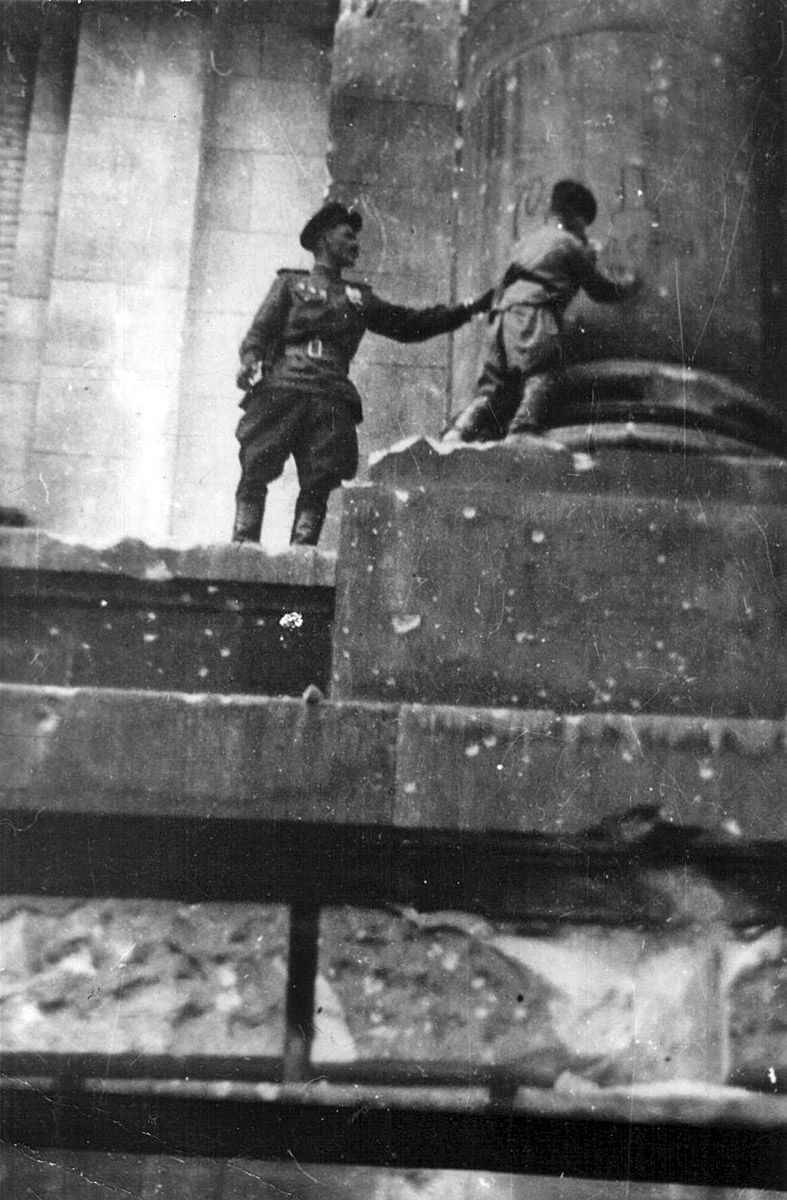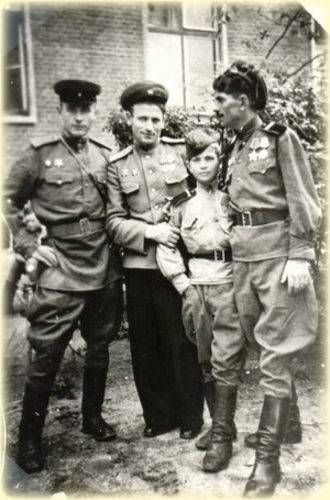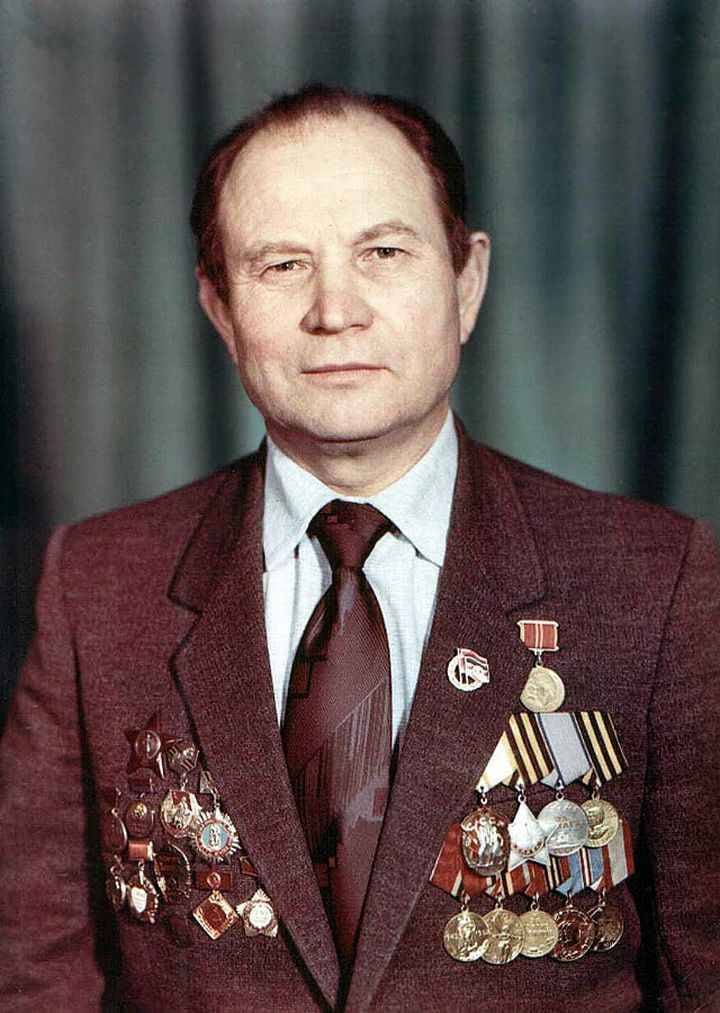Regimental son, come down to Berlin

The boy is the son of a regiment and the brave fighter Volodya Tarnovsky. When the war began, he was just eleven years old. He lived in the city of Slavyansk, Donetsk region. Volodya's father died before the Great Patriotic War, the mother married a second time for a good, kind person - they worked together at the plant. Stepfather went to the front in the first days of the war (later died). Mother, Maria Prokofievna, remained with two children - Volodya and two-year-old Tolenka. And in October, the Fascists began to rule in Slavyansk. Tarnovskys themselves burned their reserves so that they would not get to the enemy. And they ate only burnt grain stew.
The eldest son did not know, but he guessed his mother’s connection with the partisans. Sometimes I noticed how she sneaked something under the blouse, leaving the house. But he was silent. And once, being on the street, I saw a group of fascists, going straight to their house. Ahead a policeman flew ahead - Volodya knew him well, a traitor. I guessed, that is, the connection with the partisans, or betrayed the enemies of all Communists, and Maria Prokofievna was in the party. The boy wanted to get ahead of the invaders, to warn his mother, but he was late. And Maria Prokofievna, feeling the misfortune, managed to knock on her neighbor and shove her into the hands of the baby. I managed to kiss him goodbye ...
In the morning my mother was shot along with other production leaders. The boys became orphans. Life divided them: the elder could not feed the younger one and asked his stepfather's relatives for while taking care of Tolya. Those did not refuse, although the kid was a stranger by blood. The trouble begotten all good people.
Volodya himself began to live with his uncle's wife. He tried to help with the housework, messing with two young children and kept his boyish appetite at bay all the time, realizing that he was already very hungry to live. The boy traded in the neighboring villages for foodstuffs, mainly flour and corn, for things that were left of his mother. So it took more than a year. And then the boy went to the village of Shandrygolov - he wanted to barter for food. True, not only for this. Otherwise, why did he notice everything he saw so attentively in his long walking path? He asked the locals, for a long time he stood, as if just gazing at the houses occupied by the Nazis? For my “idle” curiosity, I almost didn’t get it - the policemen detained Volodka twice. The first time the bailed out soap — the boy asked them to give him products in return. The second time ran away.
In Shardygolovo (he got there almost simultaneously with our troops, but from different sides) Vovka appeared directly to the chairman of the village council. And he soon introduced the boy to captain Boris Davidovich Zakharov. Thus began a new page in the life of Volodi Tarnovsky, from now on - a fighter of the 1 division of the 370 artillery regiment. The young soldier immediately proved his wits - it was not for nothing that he noticed everything he saw, this was very useful for the artillerymen. True, the occasion came out with age - the boy attributed to himself a year, hoping for good luck. But Captain Zakharov, looking at the recruit, understood the catch and asked Volodya to give me my word of honor. It was here that the “thirteen-year-old” lowered his head ...
The service began, as it should, with difficulties and dangers. The division received an order to relocate and join the battle in the area where the gap was formed. In the evening we set off. The weather that night was not the helpers: semolina, and only that. Apparently, therefore, several vehicles with ammunition and fuel lagged behind the column. However, they discovered this only when they had already arrived at their destination. It was clear: someone had to go back and find the lost ones. But to whom? The drivers who walked in the column followed the lead. And I did not remember the leading road. Volodya called. And although the rest of the fighters were somewhat cautious about such an initiative, Zakharov did not doubt. He got into the car himself, sat the boy. And brought Volodya to ours! For this, Boris Davidovich gave him his "Walter". And from that moment the boy became a scout, which was a huge reward for him. After all, before he was appointed messenger, and Volodya thought it was humiliating for a man.
 The fighter Tarnovsky made a special shape - the boy was short and frail. Invented and with shoes: found a craftsman who sewed boots from the raincoat.
The fighter Tarnovsky made a special shape - the boy was short and frail. Invented and with shoes: found a craftsman who sewed boots from the raincoat. It seemed that the boy was taking care of fate itself. So, once he was with four brother-soldiers in a dugout. Volodya urgently summoned to headquarters. And at this time the shelling began, a shell hit the dugout. Another time, they came under fire while moving to a new frontier. We jumped out of the cars, and seconds later in Volodin - a direct hit.
... In the village of Zolotaya Balka, battles were still going on, our soldiers did not completely clear her of the fascists. Captain Shchebalov (according to some sources - Shabanov) and Volodya went to this village for exploration. But as soon as they got there, the machine-gun fire rang out and the captain fell. Shot from the spot, the enemies themselves did not show up. The boy leaned over Shchebalov, he had already lost consciousness. I tried to raise - not enough power. Then Volodya rushed back to his own. Led help. So on the chest of the young soldier appeared the Order of Glory III degree. Here in the abbreviation is an extract from the award list, which describes this and other feats of Volodya: “February 23 1944 of the year when crossing the Dnieper River in battles for the Golden Balka of the Nikolaev region, the commander of the 3 division, Captain Shchebalov, was seriously injured. Under machine-gun fire, the enemy provided first aid and, together with the corporal Torshin, carried out the wounded man from the battlefield, thereby saving his life. During the ice drift on the Dnieper River, when the ferry and linear communications were not working, the boat was transported daily with food and food for radio stations. 17 in May 1944 of the year in the Sley region of the Moldavian SSR, the enemy began to cross the Dniester River. Tarnovsky Went into the area of the crossing, found out the situation, as a result of which the crossing was stopped by the fire of the division. On the left bank of the Dniester, west of Varnitsa, he made his way to the neutral zone and found three enemy machine-gun points that interfered with our infantry. They were subsequently suppressed ... "
The following boy received his award for taking a German officer. They stumbled upon the enemy during reconnaissance (Tarnovsky and the foreman set off for the mission) - he chose a comfortable position and did not allow the gunfire to get close. Volodya volunteered to bypass the enemy. While the foreman shot back, he crawled imperceptibly. I found a place, got ready to shoot, and suddenly I saw that the fascist was a senior officer. "Hande hoh!" - Volodya shouted and jumped to the Nazis. He was confused, turned around and completely taken aback when he saw such a fighter. But the sergeant already ran to the rescue. So they took the prisoner to headquarters: Volodya was the first to go, and after him the foreman. Here, as in the famous jokes, everyone laughed ...
Fighting roads led the division through Ukraine, it liberated Stalin - and became known as Stalin. Liberated and Poland. Then the path lay in the nest of fascism - Berlin ...
Volodya never parted with the gift of Captain Zakharov - a pistol. Looking ahead, I will say that, by and large, the gun fired only a few times, and all in one day. But did not be on that fateful day of "Walter" - the son of the regiment would not live to see our Victory.
It happened in Berlin, when happiness was already so close and that is why the boy’s boyhood, which was already big, increased again and again. From the attic of one house he scribbled a machine gun, not allowing to get close. Volodya and several adult fighters went round to destroy the nazis. In the heat of the attack, the boy separated from his own and fell into the room. It was already getting dark, and in the gathering twilight Volodya could see two Germans. Gave an automatic fire, put the nearest. And ran out of ammo. The fascist has already disassembled that in front of him a “Kinder”, pounced on Vovka and began to choke. And then the boy from his last strength pulled out the "Walter". The gun, which was originally supposed to serve the Nazis, saved the life of a Russian boy.
... Vladimir Vladimirovich Tarnovsky lived a long life. He returned to his native Slavyansk, began to live in an orphanage. He sat at the desk again, at the age of fifteen he entered the fifth grade. And graduated from school with a gold medal! Received a higher education. He worked in Odessa, then in Riga at the ship repair plant.
See how many awards ...

Information